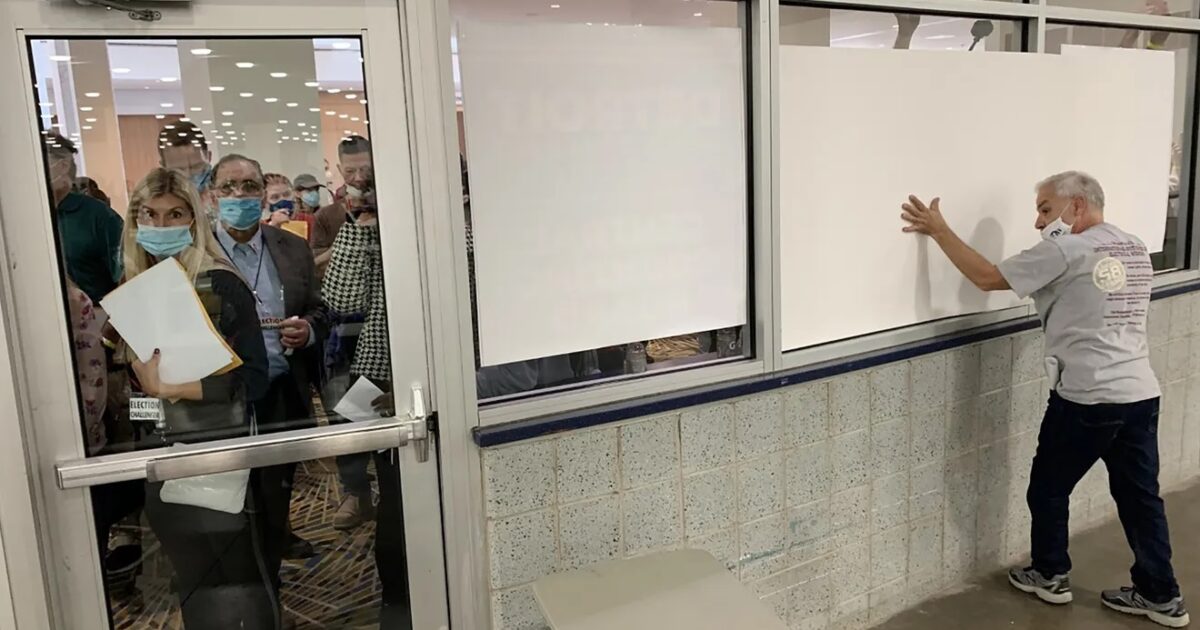Op-Ed: When “Random” Sampling Skips the Crime Scene
By Patrice Johnson
Chairperson, Michigan Fair Elections Institute
Imagine a health inspector conducting a “random” restaurant safety audit that somehow manages to skip McDonald’s and Burger King—the two busiest establishments in town, and imagine they had the longest history of violations. Then imagine the health inspector was inspecting his own work. Then the inspector announces that all restaurants passed with flying colors.
Would you trust that audit?
MI Democrat SOS Jocelyn Benson
Yet this scenario mirrors what happened with Michigan’s 2024 post-election audit. Secretary of State Jocelyn Benson’s office announced in October 2025—ten months after the election—that Michigan’s ballot counting achieved 99.97% accuracy. Impressive. But their “random” sample conspicuously excluded Detroit and Troy, the largest cities in Michigan’s two most populous counties, despite Detroit’s notorious election administration challenges.
When randomness becomes suspiciously convenient, trust evaporates.
The audit took ten months to complete and publish—an extraordinary delay that national election security experts Susan Greenhalgh and Dr. David Jefferson called “inadequate” and lacking “transparency” in their August 2025 analysis of swing-state audits. Michigan’s 2020 audit required only five months. Why did 2024 take twice as long?
Delays matter.
Risk-limiting audits exist precisely to provide swift statistical assurance when public scrutiny peaks—immediately after elections. Publishing results ten months later, when news cycles have moved on and memories have faded, defeats the purpose. In a swing state with controversial election administration, such delays amplify rather than alleviate distrust.
But timing represents only one problem. The audit examined whether Michigan counts ballots accurately—it did—while ignoring whether those ballots came from eligible voters at legitimate addresses, whether signatures on 2,081,265 mail-in ballots matched registration records, and whether Michigan’s voter databases comply with federal maintenance requirements.
Think of it this way: A referee who accurately counts touchdowns but never checks whether players stayed in bounds or were qualified to play hasn’t really validated the game’s outcome. Michigan’s audit counted correctly but left the field unexamined.
The Michigan Fair Elections Institute discovered why examining the field matters. Our statistically rigorous analysis of 384 randomly sampled registrations from Michigan’s 542,121 voters inactive since 2019 or earlier (95% confidence, 5% margin of error) revealed troubling patterns documented in our Ensuring Electoral Integrity report.
We found 27.6% of sampled registrations contained exceptions (projected errors): deceased voters (21,141 scaled statewide), out-of-state dual registrations (53,702), and invalid addresses (4,225).
MI SOS Jocelyn Benson-and her Ghost voters
Nearly three-quarters either never voted or last voted before 2010—totaling 398,121 inactive registrations statewide. Michigan maintains 558,627 voters who have been inactive since 2019 or earlier, exceeding the National Voter Registration Act’s four-year maximum by 375%.
When we mailed confirmation letters to verify residency, 9.11% returned as undeliverable. Detroit showed the highest concentration of verification challenges: 57.14% indeterminate residency among long-inactive registrations. Yet the state’s “random” audit somehow missed this red flag entirely.
Our comprehensive MFEI Investigation into Michigan Elections documented systematic alterations to voter history records months after certification, 82,467 voter IDs temporarily linked to duplicate votes in October 2024 (attributed to a “glitch”), and premature destruction of electronic pollbook data despite federal requirements for 22-month retention. Michigan appears to maintain approximately 800,000 potentially ineligible registrations—far exceeding federal limits.
The audit also ignored equipment security concerns. Michigan law requires that voting systems be “certified by an independent testing authority accredited by the National Association of State Election Directors and by the Board of State Canvassers” under MCL 168.795a, but Michigan’s certification process lacks independent verification. University of Michigan computer scientist Professor Alex Halderman’s analysis identified four significant vulnerabilities in Michigan’s deployed equipment, including malware risks that could alter vote totals without detection. Proprietary source code remains hidden from public examination—yet the audit declared machines accurate without examining whether the certification process itself protects against these documented threats.
Michigan deserves better.
The Supreme Court’s 2018 Husted v. A. Philip Randolph Institute ruling affirms that states must remove long-inactive registrations. Michigan should systematically clean up its 558,627 voters who have been inactive since 2019 or earlier.
We must enforce 22-month federal record retention rather than destroying evidence within days, and allow independent computer scientists to examine voting equipment source code as federal cybersecurity experts recommend.
Future audits should employ truly independent protocols. Bipartisan observers—not the Secretary of State’s office—should select precincts through transparent randomization that explicitly includes high-risk jurisdictions like Detroit. No more “random” samples that mysteriously skip the places that matter most.
2020 Detroit election images: Alleged ballot stuffing caught on video in Detroit, the early morning on the day after the election drop off of ballots in the back hallway of the TCF Center in Detroit, and the blocking of GOP observers in Michigan (Gateway Pundit photos)
Michigan needs systematic verification of mail-in ballot signatures and application of the same statistical rigor that confirmed 99.97% counting accuracy to voter registration database accuracy, potentially through independent federal review under the Help America Vote Act and National Voter Registration Act.
Michigan counts ballots accurately—an achievement worth celebrating. But when the health inspector’s “random” restaurant audit skips the establishments with the worst violations, when the referee counts touchdowns without checking boundaries or player eligibility, when election audits take ten months and somehow miss Detroit—citizens rightly question whether these exercises serve transparency or theater.
Real election integrity requires examining all the relevant pieces: accurate counting, eligible voters, verified signatures, maintained databases, secure equipment, independent oversight, and timely reporting. Michigan has mastered one piece. The others await our commitment to genuine transparency that serves every voter.
Patrice Johnson chairs the Michigan Fair Elections Institute, a 501(c)(3) nonprofit dedicated to election integrity. Reports available at mifairelections.org/library.
The post OOPS! Michigan’s SOS Jocelyn Benson’s Laughable 2024 Election Audit Is Worse Than Anyone Imagined—“Random” Sampling Conveniently Excluded State’s Most Crooked City—Why? appeared first on The Gateway Pundit.











